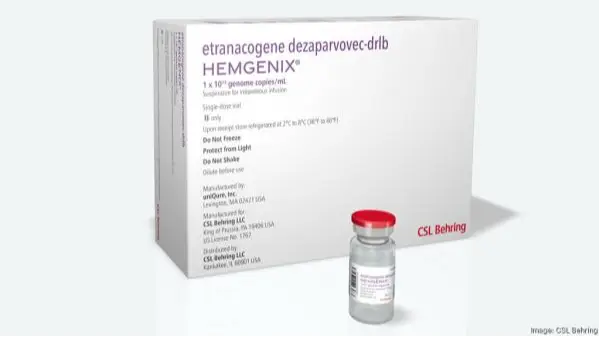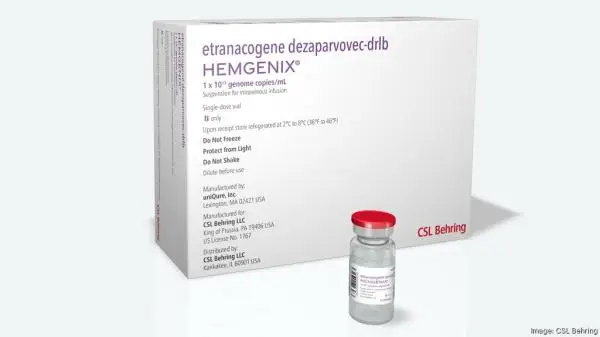
A man has been given a new lease of life after becoming the first ever NHS patient to receive a dose of what's been dubbed the 'world's most expensive' drug.
Although you can't put a price on your health, the same can't be said for medicine - as some wonder drugs can cost millions.
The anonymous 44-year-old underwent the one-off treatment at Guy's and St Thomas' NHS Foundation Trust in the UK capital yesterday (18 June).
He has told how he will now be able to live a life he has 'always dreamed of' after receiving a dose of the drug named Hemgenix.
Advert
It doesn't come cheap, as it boasts an estimated cost of a whopping £2.6 million per patient - but it is set to be revolutionary for those who suffer from haemophilia B.
It is the only treatment of its kind for the clotting disorder and it is delivered via a one-off infusion that takes between one to two hours.
Before now, those with haemophilia B have had to have multiple infusions a week to combat the life-threatening symptoms of the condition.
Needless to say, Hemgenix could seriously change the game.
What is haemophilia B?

Haemophilia B is a type of clotting disorder which occurs because a specific protein - known as Factor IX - is missing or lacking in a person's blood.
This is pretty unfortunate, given that we need clotting to stop cuts, wounds and injuries from bleeding - and those with this condition can lose a life-threatening amount of blood from just a minor wound.
For haemophilia B sufferers, injured blood vessels cannot heal correctly, according to the Great Ormond Street Hospital.
It explains: "Factor IX in the blood is too low to complete the clotting process. Bleeding may occur inside the body as well as from the skin - this can include bleeds inside the joints.
"It can follow an injury or sometimes no trigger occurs – this is called a ‘spontaneous bleed’. Over time, each bleed can damage the joint making it swollen and harder to bend.
"Bruising is also common in people with Haemophilia B. Other areas of the body may develop bleeds, such as the digestive or urinary systems, where blood may be visible in the faeces or urine.
"Nose bleeds can also happen spontaneously."
How does Hemgenix work?
Hemgenix was approved for use on the NHS in 2024, but Wednesday marked the first time that the treatment has been administered by the NHS.
The drug - also known as etranacogene dezaparvovec - works by replacing the defective gene which haemophilia B sufferers are lacking in, allowing their blood to clot.
The one-time Hemgenix infusion gets rid of the need for patients to receive regular injections.
Studies have suggested that the effect can last for at least three years, but experts are hopeful that it could exceed these expectations.
There are around 2,000 people in the UK with haemophilia B, but only 260 of these with 'moderately severe or severe' forms of the condition are currently eligible to receive Hemgenix via the NHS.
By those maths, it would cost £676 million to administer the drug to all of those patients - however, it is set to save the health service money in the long run, as the lifetime costs of weekly clotting injections is around £8 million per patient.

Why is Hemgenix so expensive?
According to Drugs.com, in an explainer medically reviewed by pharmacist Leigh Ann Anderson, gene therapies like Hemgenix are more complicated to design than traditional pills, which means years of complex research and development costs need to be recouped.
Since severe haemophilia B is relatively rare, it also means fewer people will use the treatment, meaning the one-off costs will need to be higher.
And then because a one-off treatment is effective for at least three years, manufacturer CSL Behring argues the cost is worth it, since it means patients don't need to pay for ongoing long-term treatment.
When Hemgenix was approved by the FDA for use in America, CSL Behring said it would save the US healthcare system up to $5.8 million per patient.
What does Hemgenix mean for the patient?
Hemgenix, a gene therapy, has been described as a 'transformative' treatment for haemophilia B patients by the NHS' National Medical Director, Professor Sir Stephen Powis.
Explaining how the infusion works in June last year, he said it 'has the potential to significantly improve the lives of hundreds of people by helping to reduce symptoms such as painful bleeds'.
Professor Powis added: "It is a one-time therapy that could be truly life-changing for some, as it could help people avoid the need for regular hospital visits."
The 44-year-old bloke who received the first NHS administered dose of Hemgenix earlier this week explained he had been diagnosed with haemophilia B when he was just 18 months old.
"I've always had to be more cautious and to plan ahead," he told the Daily Mail. "There is a level of anxiety in that and being overly cautious has often led to missed opportunities and things I can’t do, like contact sports.
"To experience a life free of the worry and to do things that I wouldn't normally do will also be amazing.
"Not needing to plan ahead for treatment deliveries or looking up hospitals in foreign destinations when going on holiday, or having to tell people, 'Sorry, I can't do that I've got haemophilia', will be something I've always dreamed of."
Dr Pu-Lin Luo - the consultant haematologist at the London hospital who gave the dose of Hemgenix to the man - said it was an 'exciting' move towards making life easier for people with haemophilia B.
"This is a big step forward in our ability to manage haemophilia B and could change the lives of some of our patients," she said. "It is also a testament to the advancement of cell and gene therapies in the UK."